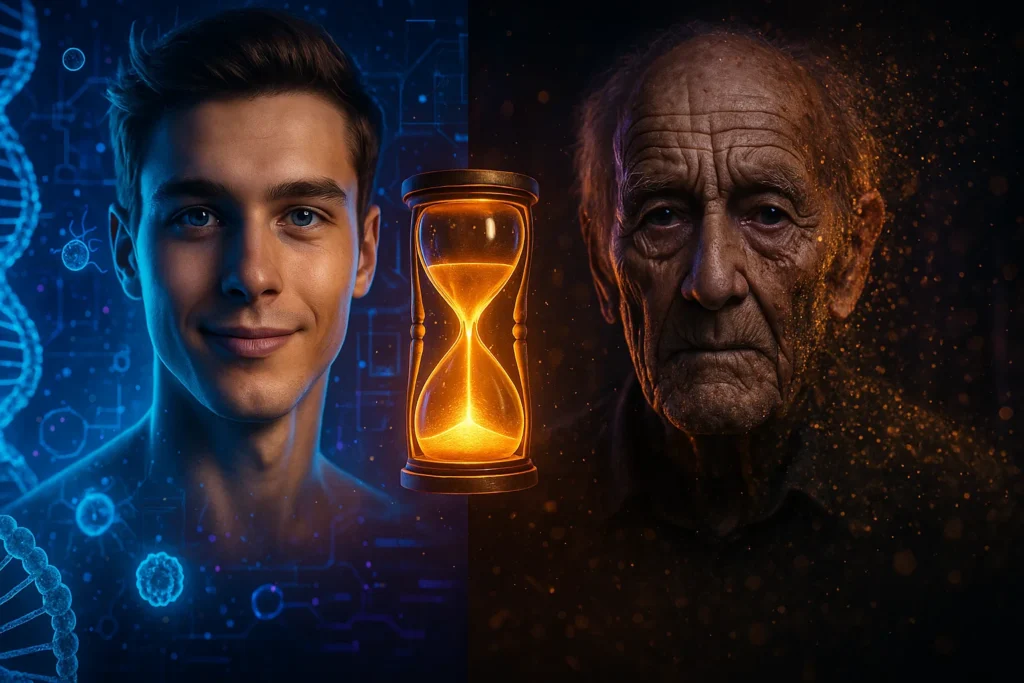What if your hair never gray? What if you stayed young for 200 years, your body was robust, and your bones no hurt? Sounds like a novel from science fiction, no? But lately, scientists worldwide have been working very hard to slow down aging—perhaps even twice how long humans live.
The big question is: If people live for 200 years, will they truly want to? Let’s look at actual science, actual opportunities, and some remarkable facts.
Why do we age?
Our body is like machinery; after some time, components start to fail. Cells break down, DNA has small errors, organs malfunction. This is aging in progress.
Among the main causes for aging are:
Small mistakes occur every time cells split:
Telomeres, which are covers for DNA, shrink. With age, they become smaller.
Inflammation: The immune system tires and erroneously targets good cells.
Cell death: Old cells become lazy or stop producing new ones; they exist but do not function correctly.
What then would happen if we might slow down or mend these problems? That’s what scientific endeavor aspires at.
Can we really slow aging?
Little by little, sure we can. Some recent findings going on are:
Gene therapy: Researchers working to repair defective genes producing aging. Some animal studies reveal a longer lifespan by 30% or more.
Senolytics, or zombie cell killers, are drugs that eradicate ancient, dormant cells. It helps mice to seem young once more, with less gray hair and stronger muscles.
NAD+ boosters are substances that decline with age within cells. Rising it can help cells remain young. Some celebrities use this therapy.
Though sounds unusual, giving old mice blood from young mice shows anti-aging benefits. Ongoing human testing.
Eating less but still sufficient food slows aging in many species known as calorie restriction. Perhaps it also applies to people.
Though we still lack eternal life, living healthy past 120 to 150 years looks achievable.
If we lived 200 years, what would life be like?
Life could be: if aging decelerates.
From 25 to 100 years: filled with energy, work, travel, family time, but more leisurely, no rush.
Brain and body remain sharp from 100 to 150 years; maybe begin a new employment or pastime.
From 150 to 200 years: Wise elder teaches youngsters and sees great-grandchildren flourish.
Imagine you can have a powerful body even if you learn several things, work several jobs, see the globe, resolve major issues.
Sounds lovely, aren’t they?
Is there a negative side, though?
Yes, slowing aging causes problems too:
Overpopulation: Earth might become congested if many people live longer and have offspring. Need homes, water, food, electricity more.
Inequality: Will only wealthy people receive anti-aging treatment? Still live normal brief life, poor people? Not fair this is.
Living 200 years might lead individuals to grow bored, depressed, lonely. Depression can result from watching several close ones pass repeatedly.
Retirement and administration: Should someone retire at 65 yet live 135 more years, who should foot their life? The retirement age could rise to 150.
Would you like to live two centuries?
It’s not only about longevity but also about quality of life.
Would you want 200 years if:
You remain fit and strong?
Your brain maintains creativity and sharpness?
No fading in your relationships lasts long.
Most people say yes only if they feel alive and happy. Nobody wants 200 years of solitude or agony.
Death?
If aging slows, death turns from natural to optional. One can decide when to pass away. Laws might vary.
This causes serious questions regarding the meaning of life. Perhaps life is unique because it is brief.
More time to love, learn, forgive, and grow—that is exquisite.
Final observations We close to find secret of long life. But this brings significant accountability with it.
If you could, would you live 200 years? Only if you remain strong, fit, joyful. Many already dream this.
Science speeds along. We will soon determine not just how long to live but also how well.
Will you say yes, therefore, if 200 years are viable?


